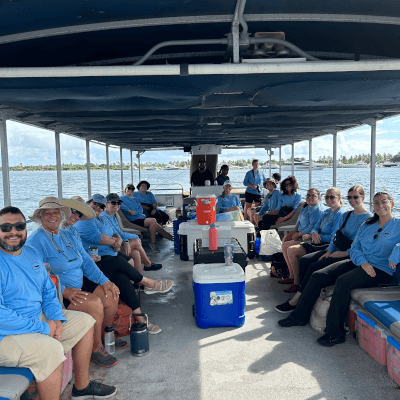Teacher Workshop with Frost Science
Miami, Florida
September 29-October 1, 2023
Overview
From September 29th to October 1st, 2023, The International SeaKeepers Society hosted a Teacher Workshop in collaboration with Frost Science. SeaKeepers’ education team was joined by 13 middle and high school teachers from Miami-Dade or Broward Counties for a weekend of marine science educational activities. We began our weekend with introductions, a chat about accessibility in education, and a presentation from Miami Waterkeeper’s Educational Outreach Coordinator, Tyler Mominey. Tyler introduced the teachers to Biscayne Bay and the creatures that inhabit it and identified many sources of pollution such as dredging, sewage leaks, and fertilizer runoff.
Now equipped with some background knowledge, we headed out to Biscayne Bay for our second day aboard DISCOVERY Yacht River Queen. The teachers were able to experience a traditional floating classroom, during which we discussed the impacts of urbanization on the bay’s ecosystems. We entered Oleta River and observed the difference in the appearance of the water in the river and the bay. We collected a water sample from Oleta River and used our EarthEcho kits to test the water for parameters such as temperature, pH, dissolved oxygen level and turbidity. After completing our testing and discussing our findings, we headed over to Sand Spur Island, a picnic island in the bay that is frequently polluted due to a lack of efficient waste management. With a quick coastal cleanup, we removed 8.4 pounds of trash from the island and discussed major observations about what we found in comparison to what we use in our own daily lives. To wrap up our day, the teachers received a presentation and activity facilitation from the Frost Education Team on sustainable fisheries management, followed by a private tour of the Aquarium.
To start the third day of our workshop, we headed up to Sea Experience in Fort Lauderdale, where we boarded a glass-bottom snorkeling boat and headed out to Euro Jacks Reef. We aimed to spend a couple of hours at the site snorkeling and practicing species identification and abundance counts using introductory information we learned about marine physiology and reef ecology. Using fish ID cards, the teachers were encouraged to quantify the amount of species they saw and try to identify them. Despite the diminished health of Florida barrier reefs, some hard and soft corals were observed, though many looked like they might be infected with tissue-damaging diseases influenced by urban pollution and climate change.
After a day on the water, we wrapped up our day with a discussion titled “Bringing it Home” aimed at applying the concepts learned to the even more localized environments experienced by the educators throughout South Florida. Many teachers shared the challenges and limitations they face in their classrooms, including concerns about limited accessibility to resources that would allow them to take their students out of the classroom and into the environment. We wrapped up our conversation by sharing tools and resources that would better allow these teachers to engage their students in marine science, conservation, and field activities in their local environments.
We had an amazing weekend with all of the teachers we hosted, and we look forward to maintaining our connections with them in order to support them in educating a new generation of students about the importance of marine conservation!
Outing Goal
To teach middle and high school science teachers in South Florida marine science activities and lesson plans that they can apply in their classrooms in order to inspire their students.





You must be logged in to post a comment.